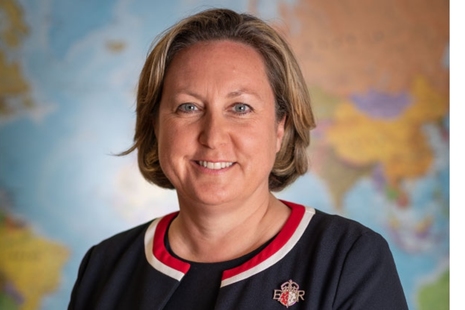
Anne-Marie Trevelyan, who is still in post as international trade secretary (at the time of writing), has defended the government’s post-Brexit trade deals at a parliamentary committee today (6 July).
She appeared before the International Trade Committee this morning.
Bloomberg reporter Joe Mayes has since tweeted that she travelled to 10 Downing Street this afternoon, amid continued speculation over Boris Johnson’s position as prime minister.
Critical report
Her appearance – which was postponed from last week – came after the committee published a report warning the government against overselling the benefits of its trade deals.
The report said that tariff reductions may benefit consumers but are unlikely to make a noticeable difference at checkouts. Australian wines, for example could become cheaper by just a few pence, it claimed.
The report also expressed disappointment that tariff-free Australian food will not be required to meet core UK food production standards in areas such as pesticide use.
Safeguards
Giving evidence to the committee on the UK’s New Zealand trade deal, Trevelyan said that the government had included “a strong set of safeguards” to protect farmers, including a 15-year period to liberalisation.
The committee chair Angus MacNeill claimed that the New Zealand deal will only contribute an additional 0.08% to UK GDP.
Accepting that deals with New Zealand and Australia will have a relatively small GDP impact, Trevelyan said they should instead be viewed through the prism of the UK’s bid to join the Comprehensive and Progressive Agreement for Trans-Pacific Partnership (CPTPP).
Australia and New Zealand are both founding members of the 11-nation Pacific bloc.
Geographical protection
The Standard reports that the UK’s deal with Australia fails to secure protection for the names of iconic UK food and drink exports such as Melton Mowbray pork pies, Scotch whisky, Welsh lamb, and Irish cream liqueur.
According to the committee, it remains legal in Australia to impersonate these products because the agreement doesn’t include protected geographic designations of origin.
Trade unlocked
The Department for International Trade told the FT that the trade deal with Australia would “unlock £10.4bn of additional bilateral trade”.
“We have always said that we will not compromise the UK’s high environmental, animal welfare or food safety standards,” it said, adding that the committee had failed to grasp that Australia did not have a geographical indications scheme for food.
“Should they introduce such a scheme we have agreed to review our agreement,” the spokesperson added.
Points of interest
Grace Thompson, Public Affairs Adviser at the IOE&IT, told the IOE&IT Daily Update that the UK’s future trade deals could present difficulties for the UK’s ‘green trade’ strategy.
She said: “It will be interesting to note, in future FTAs, how potentially conflicting environmental strategies between countries are handled, as this was raised as a point by the committee in relation to the weakening of environmental laws in particular countries.”
“Whilst Australia has agreed to work together in relation to the Paris Agreement and the Net Zero agenda, other countries may not be able to meet these similar standards,” she added.
Trevelyan stays
Thanked by the International Trade Committee chair for attending this morning’s session on the New Zealand trade deal, Trevelyan said she had “no plans” to resign afterwards, tweeted Reuters reporter Alistair Smout.
However, exports minister Mike Freer has since resigned.
Yesterday also saw the resignations of two trade envoys, Theo Clarke (Kenya) and Andrew Murrison (Morocco).



